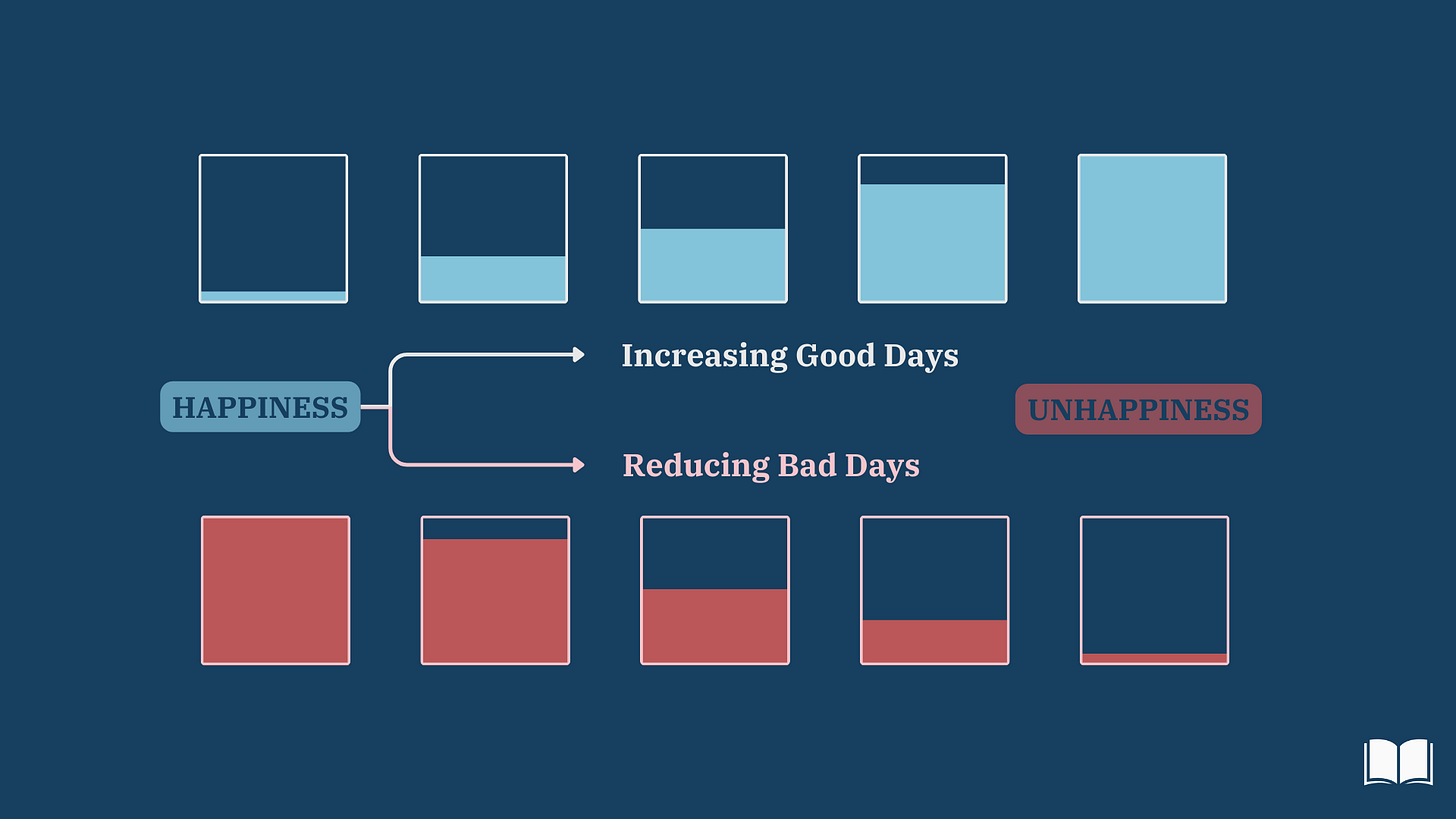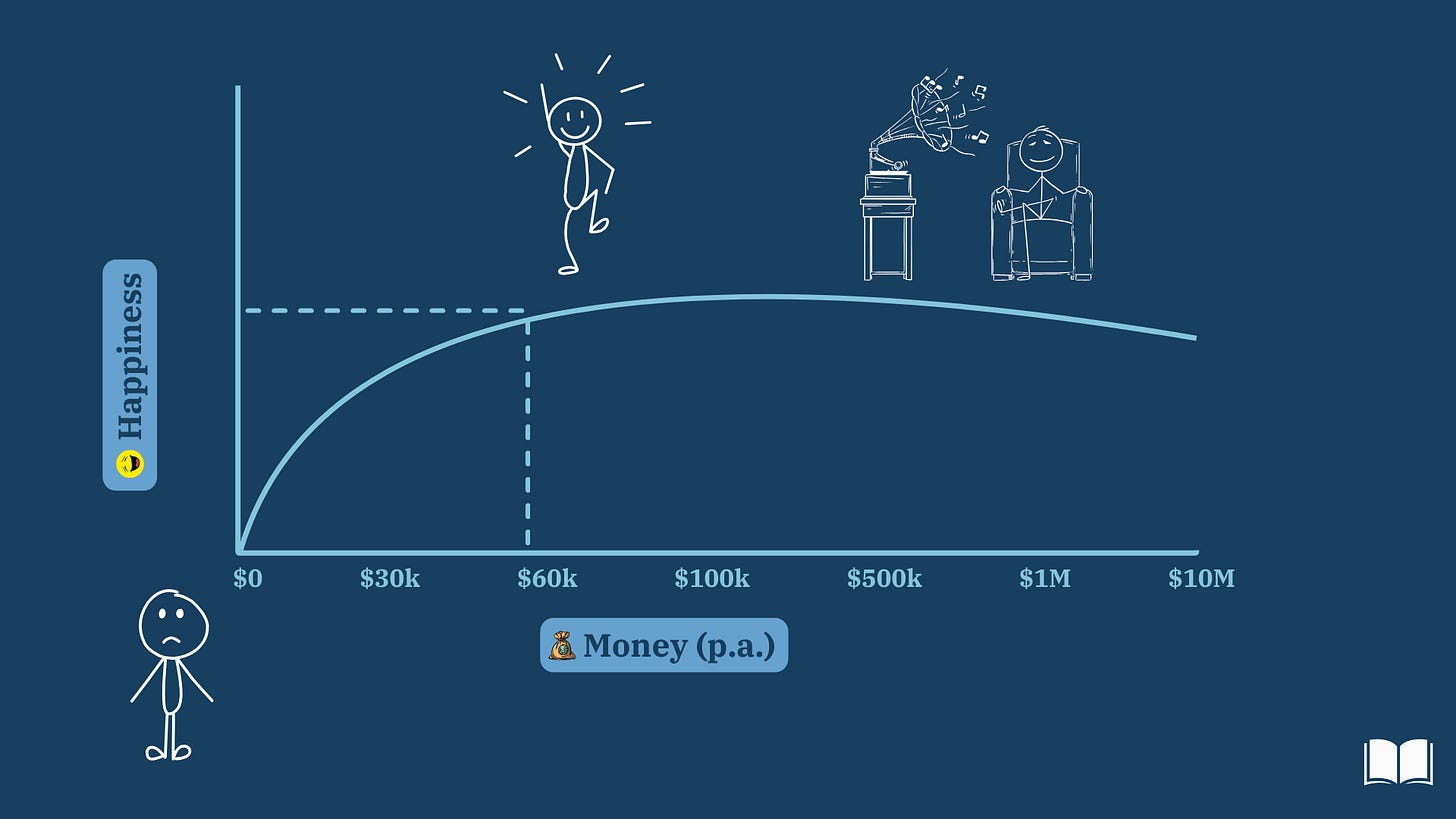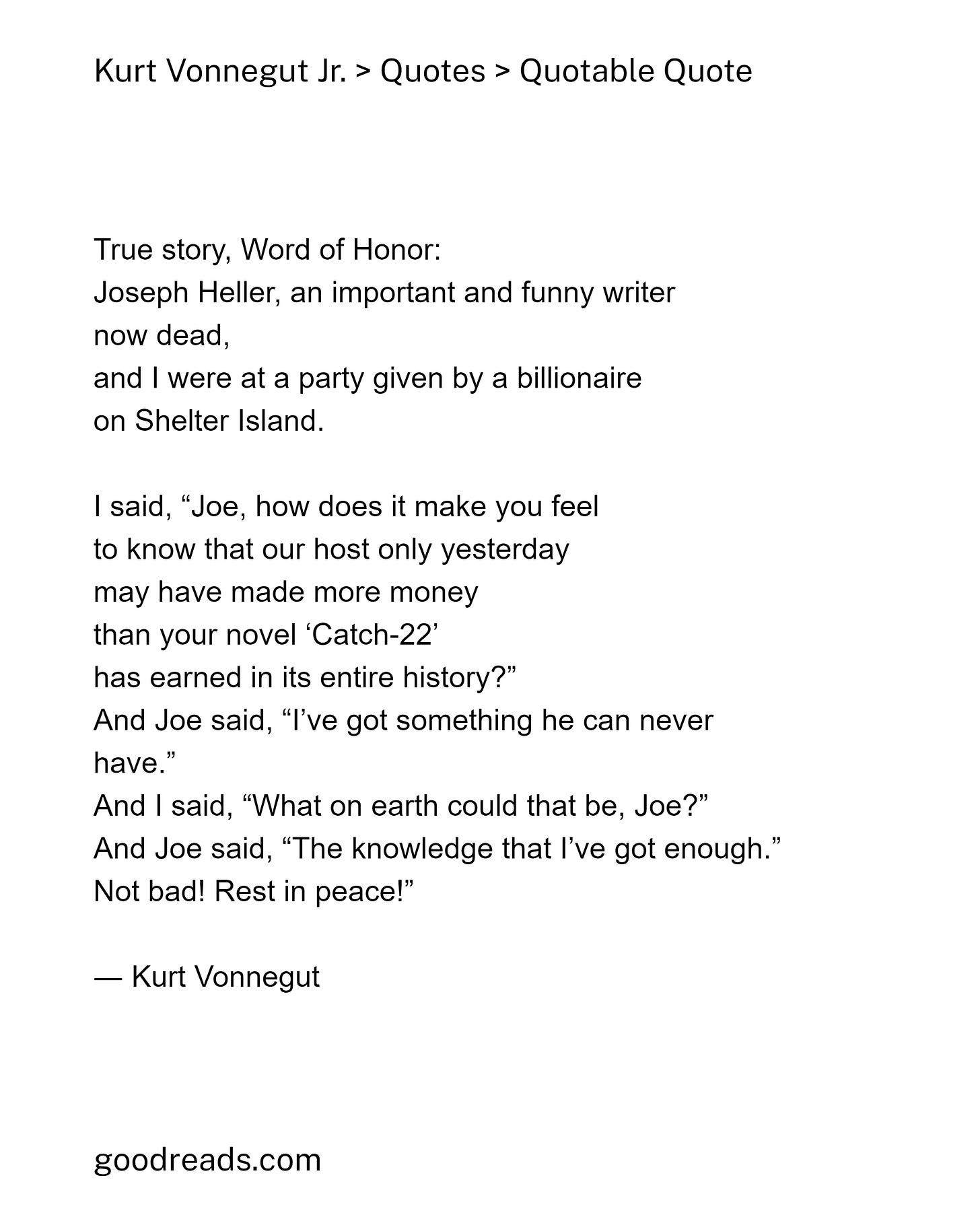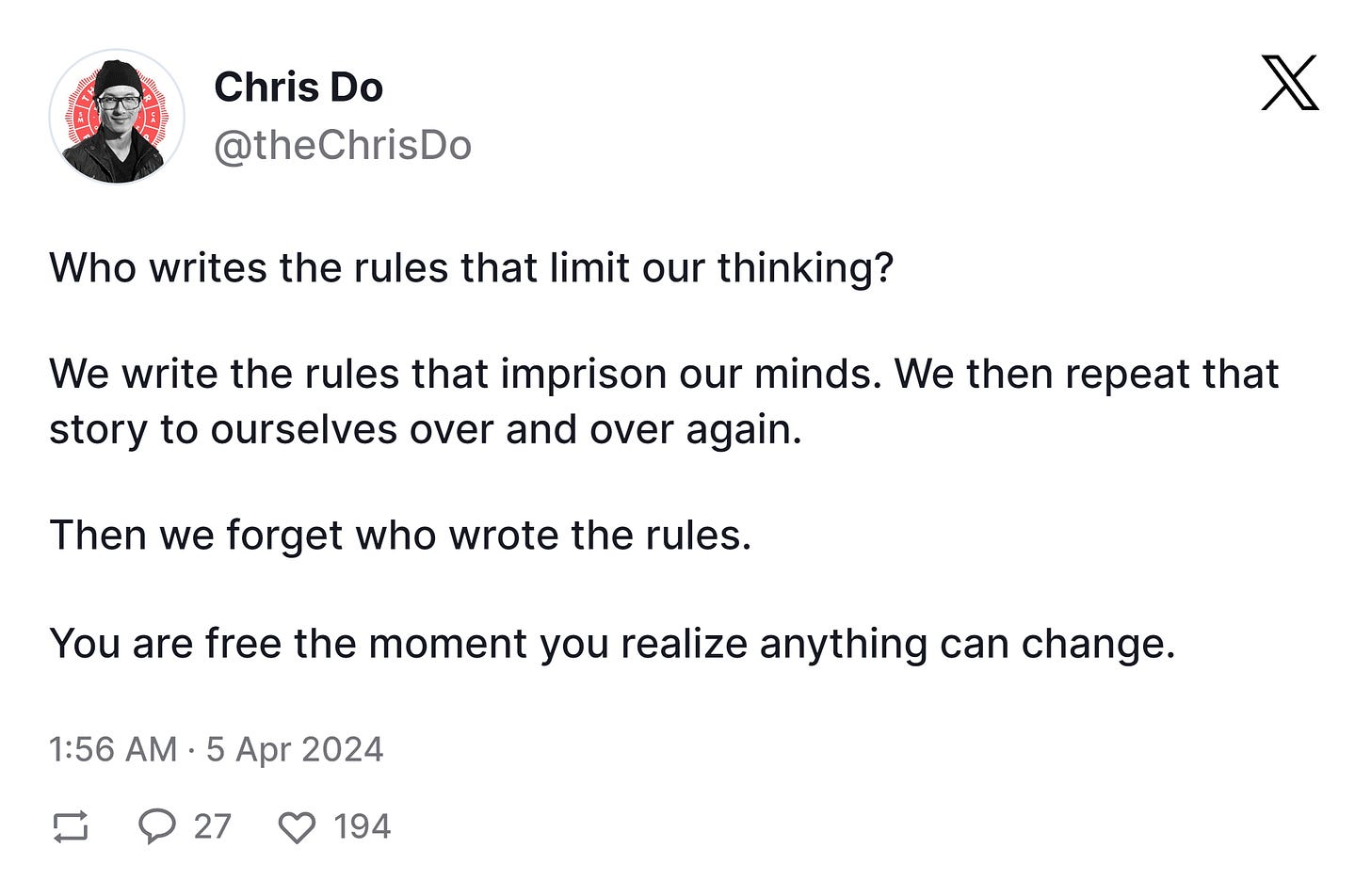About Money, Independence and Happiness by Morgan Housel and Nassim Nicholas Taleb
True Independence is saying 'I can do whatever I want today.'
Hey self-directed learners,
I'm super excited to share the insights I collected this week with you guys. Today we’re diving into the relationship between money, independence, and happiness. We’ll be reflecting on ideas from Morgan Housel, author of The Psychology of Money and Nassim Taleb, author of The Black Swan to explore:
Why true happiness isn't about adding more, but reducing misery
What real independence with money looks like (spoiler: not everyone with money is truly independent)
Why self-knowledge is important in maintaining control over your life—and sustaining freedom
Let’s dive in!
Morgan Housel always approaches problems not just through facts, but by focusing on human behavior—how people feel and react in the moment. He’s great at using relatable stories to make his points clear. Here’s one that offers a new way to think about happiness.
Most of happiness is not increasing how happy you are, it's decreasing how miserable you are. That's the nuance of it that's really important. It's not that the happiest people are very happy, it's that they tend to have fewer bad days than other people. That's the best that we can aim for.
So then if the question is, it's not about adding happiness, how can I remove unhappiness? What makes people unhappy?
There's this great story that I like from FDR, who, when he was a child, he told his mom, I think he was about five years old.
He said,
"My life is just completely dictated by rules. And I don't like these rules."
So Sarah Roosevelt, his mother said,
"Okay, little Frankie Roosevelt. Tomorrow, you can do anything you want. The day is yours, whatever you want to do, you go and do it."
She wrote in her diary later that night, the next day, that even though the day was his own, he did his normal routine like he would normally do at the same schedule that he would normally do. So doing something on your own terms that you want to do, even if you're doing the exact same thing, feels so much better than if someone is telling you to do it.
And for a lot of people who are financially independent, they don't have to work, but they still go to work because they want to do it.
And if we can use wealth, not just for nicer stuff, not just for the bigger house and the flashy car and whatnot, but if you can use it for a level of independence, so that you can just wake up every morning and say,
"I can do whatever I want today."
I just want to wake up every morning and say,
"This day is mine, it's not anyone else's, I control this day."
And if I can do that, that's using wealth to gain happiness better than any other way I can.
And everyone says that and I think it can still get it wrong, because a lot of experiences you're doing for other people. You're doing it for the Instagram photo, you're doing it because you want to tell your friends that you vacation in the Hamptons, whatever it might be. You're doing it for them.
True independence and freedom, to me, is you're just doing it for the internal benchmarks. You're just doing it for yourself.
And dependence on other people's view of you is dependence. It's a special form of slavery to their opinions and in their view of you. I think you're really only independent when you can use your money to do what you want to do, for as long as you want to do.
Source → Invest to Gain Freedom by Morgan Housel in Conversation with Chris Davis
This insights on happiness remind me of Daniel Kahneman’s concept of loss aversion.
We tend to value our losses twice as much as our gains. This means that for every 10 bad days in month, you need 20 good ones to balance things out. That's 2:1. But it also signifies that removing each bad day doesn’t just add to your happiness—it multiplies it.
For example, if you reduce your bad days from 10 to 5 in a month, your ratio of happy to unhappy days shifts from 2:1 to 5:1 - a fivefold increase in happiness. It’s not about chasing constant joy, but about minimizing the miserable moments.
Problem: We tend to relive our negative experiences more easily than our positive ones. Bad memories come back stronger, while good memories fade.
Even when we recall good memories, we often feel bad because we doubt our ability to recreate those moments, trapping us in a cycle of negativity.
The solution?
Focus on reducing bad days, and train your mind to revisit and amplify your good memories.
Daniel Kahneman on Money and Happiness
Under $60,000 per annum, for Americans, people are unhappy and they get progressively unhappier the poorer they get.
Above $60,000 we get absolutely flat line.
I mean I've rarely seen lines so flat.
Conclusion:
Money doesn't buy you experiential happiness
but lacks of money certainly buy you misery,
and we can measure that misery
very, very clearly.Here’s another profound snippet that shows how money can truly buy the independence you’ve always dreamed of.
An anecdote appears in Aristotle’s Politics concerning the pre-Socratic philosopher and mathematician Thales of Miletus.
Thales was a philosopher, a Greek-speaking Ionian of Phoenician stock from the coastal town of Miletus in Asia Minor, and like some philosophers, he enjoyed what he was doing.
But Thales, as a philosopher, was characteristically impecunious. He got tired of his buddies with more transactional lives hinting at him that “those who can, do, and others philosophize.”
He performed the following prowess: he put a down payment on the seasonal use of every olive press in the vicinity of Miletus and Chios, which he got at low rent. The harvest turned out to be extremely bountiful and there was demand for olive presses, so he released the owners of olive presses on his own terms, building a substantial fortune in the process. Then he went back to philosophizing.
What he collected was large, perhaps not enough to make him massively wealthy, but enough to make the point—to others but also, I suspect, to himself—that he talked the talk and was truly above, not below, wealth.
This kind of sum I’ve called in my vernacular “f*** you money”—a sum large enough to get most, if not all, of the advantages of wealth (the most important one being independence and the ability to only occupy your mind with matters that interest you) but not its side effects, such as having to attend a black-tie charity event and being forced to listen to a polite exposition of the details of a marble-rich house renovation. The worst side effect of wealth is the social associations it forces on its victims, as people with big houses tend to end up socializing with other people with big houses.
Nassim Taleb takes this idea further when he talks about money and independence. He emphasizes that the true value of money isn’t luxury or status—it's freedom to focus on what interests you most.
This echoes what Morgan Housel said: financial independence isn’t about accumulating more stuff, it’s about waking up and saying, "Today, I can do whatever I want."
What I'm doing is for myself. And I can give my best since I don't have to compromise today. It gives the ability to work not because you have to, but because you want to. That's what truly financial independent people do.
One goal we all hope to achieve with money is control over our lives. But money alone doesn’t guarantee that. It comes with costs—the most significant being the pressure to maintain certain social circles, or to live inauthentically. Plus, there’s the risk of becoming addicted to the pursuit of more.
That’s why it takes more than just money.
It requires self-control, self-knowledge, and self-reliance.
For many of the most successful investors I’ve interviewed, that freedom to construct a life that aligns authentically with their passions and peculiarities may be the single greatest luxury that money can buy.
Bill Ackman, a billionaire known for his bold and controversial bets,
once told me,
“The most important personal driver for me very early on was independence. I wanted to be financially independent. I wanted to be independent enough to say what I thought. And I wanted to be independent enough to do what I thought was right.”
William Green, author of Richer Wiser HappierKey Takeaways
1. Money can't buy happiness, but lack of money can certainly buy you misery.
2. Focus on reducing bad days.
3. Learn the art of recalling and amplifying good memories.
4. True value of money lies in freedom to focus on what interests you most.
5. Financial freedom without self-knowledge is no financial freedom.
I’d like to end the newsletter with a brief yet powerful story that highlights how to avoid the pitfalls of money and find true satisfaction.
Content Diet This Week
🎥 Mihaly Csikszentmihalyi: Flow, the secret to happiness
🔉 Nassim Taleb: How Things Gain from Disorder Entire Talk
📝 The Ultimate Deliberate Practice Guide: How to Be the Best
📝 The Day You Became A Better Writer
📚New Books
📖 The Simple Path To Wealth by JL Collins
📖 Letters from a Self-Made Merchant to His Son by George Horace Lorimer
P.S.
Thanks for reading the second edition of Distill Notes. My goal is to be a life-long learner. And along the way, I will curate the best - the most valuable and practical insights for all of us.
See you guys next week!
#you_are_more








